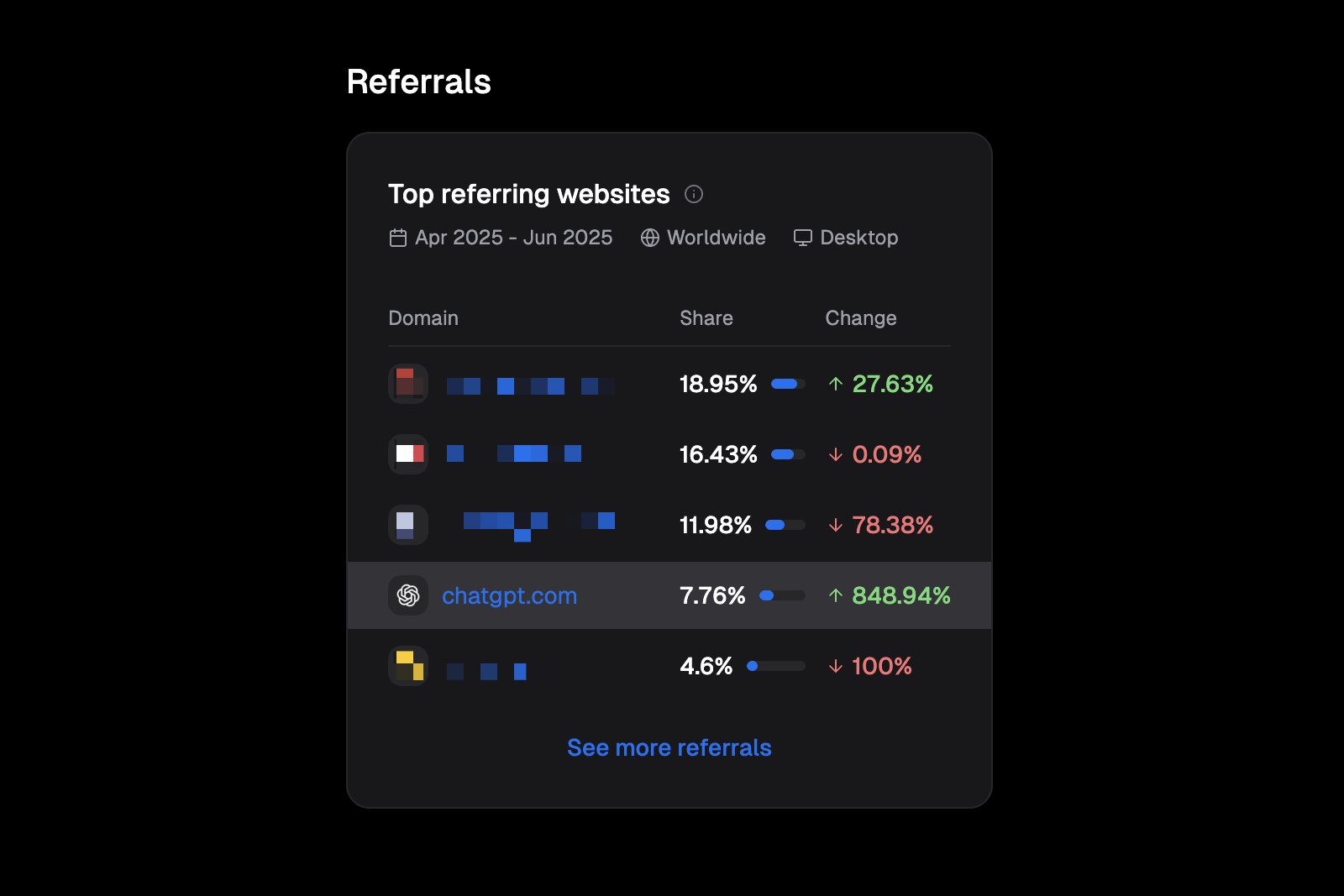10 Proven Ways to Get Your Brand Mentioned in AI Answers
Getting your brand mentioned by AI like ChatGPT comes down to being present where AI learns: high-ranking content, Reddit discussions, YouTube videos, and authoritative publications.
When AI generates answers, it pulls from these sources to recommend brands. The more your brand appears with the right context, and sentiment the more AI will mention you.
10 ways to make your brand appear in ChatGPT, Perplexity, and Google AI Overviews:
- Make Sure AI Can Actually Access Your Website - Check robots.txt and remove AI crawler blocks
- Find Out If You're Already Getting Mentioned - Test queries and track your current visibility
- Get Added to Content AI Already Uses - Reach out to sites AI sources to include your brand
- Create Better Content Than What's Currently Ranking - Outrank competitors with superior content
- Work on Your SEO - No Rankings, No AI Mentions - 50% of AI citations come from top Google results
- Make Your Content Easy for AI and Humans to Read - Use Q&A format and clear headings
- Add Statistics, Expert Quotes, and Credible Sources - Citations boost visibility by 40%
- Dominate Reddit - Build presence where AI gets real opinions
- Create YouTube Videos - Key to get into Google AI Overviews
- Launch Strategic PR Campaigns - Build authority through media mentions
"This week, ChatGPT is on track to reach 700M weekly active users — up from 500M at the end of March and 4× since last year." [Source:X Post]
Nick Turley, VP & Head of ChatGPT at OpenAI
That's 700 million people potentially asking about your industry every week.
Each strategy below includes exact steps, templates, and real examples you can implement today.
1. Make Sure AI Can Actually Access Your Website
The #1 mistake: Blocking AI crawlers then wondering why your site never gets mentioned.
Go to yoursite.com/robots.txt right now. Search for these terms:
- GPTBot
- ChatGPT-User
- OAI-SearchBot
- ClaudeBot
- Claude-SearchBot
- Claude-User
- PerplexityBot
- Perplexity-User
- Google-Extended
Source: (OpenAI bots, Anthropic crawlers, and Perplexity bots)
If you see "Disallow" next to any of these, you're invisible to AI. It's like putting a "Keep Out" sign on your door then wondering why nobody visits.
How to fix it:
Replace blocking rules with:
User-agent: GPTBotAllow: /
User-agent: ChatGPT-UserAllow: /
User-agent: OAI-SearchBotAllow: /
User-agent: ClaudeBotAllow: /
User-agent: Google-ExtendedAllow: /Pro tip: Set up AI bot analytics to actually see when these crawlers visit.
You'll discover:
- If AI is visting your site
- Which AI (like ChatGPT, Perplexity etc) is visiting your site
- Which pages AI reads most
- When crawl activity spikes
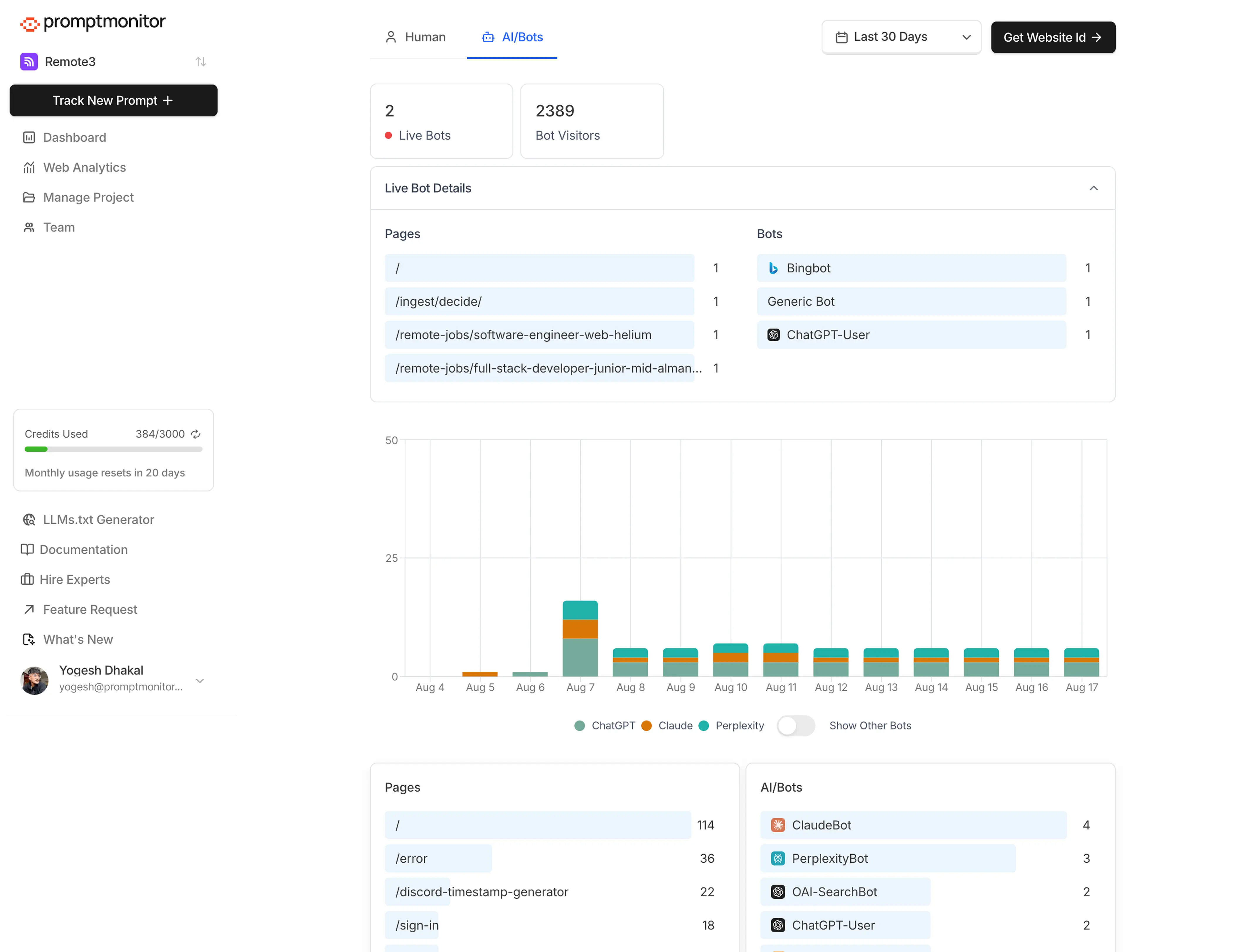
One of @vercel's top ecom customers. ChatGPT now referring 8% of traffic. Up 848.94%. Retail. Imagine… blocking AI. [Source: X Post]
Guillermo Rauch, CEO of Vercel
Common mistakes that block AI:
- Cloudflare's AI bot protection - Garry Tan, President of Y Combinator reported: "CloudFlare blocked all AI on *.ycombinator.com without our permission or even notifying us"
- Password-protected content
- JavaScript-heavy pages that don't render
- Paywalls on valuable content
Remember: AI can't recommend what it can't read. Open the door first.
2. Find Out If You're Already Getting Mentioned
Before fixing anything, know where you stand.
1. Test these prompt templates in ChatGPT:
- "What's the best [your category] for [specific use case]?" e.g "what's the best google analytics alternative for gdpr compliance"
- "best [your category] with [specific feature]?" e.g "best project management tool with slack integration"
- "How do I [problem you solve] without [common pain point]?" e.g "how do I get my brand mentioned in ai without big budget"
- "[your brand] vs [top competitor]" e.g "iPhone 16 pro vs Samsung Galaxy s25 ultra"
- "best [your category] tool for [target audience]" e.g "best project management tool for a early stage startup with 10 team members"
2. Track two critical things:
- Presence: Are you mentioned at all?
- Sentiment: How does AI describe you? (Positive, neutral, or negative)
3. Create a tracking spreadsheet:
| Prompt | Mentioned? | Sentiment | Sources Cited | AI Platform | Date |
|---|---|---|---|---|---|
| Best PM tool for startups | No | - | Monday, Asana, Notion | ChatGPT | 1/8/25 |
| Affordable project software | Yes | Neutral | G2, Capterra | ChatGPT | 1/8/25 |
| Project tools comparison | Yes | Positive | Reddit, TechCrunch | Perplexity | 1/8/25 |
Test weekly. AI responses change as it learns from new data.
There is an easier automated way to track brand mentions in AI:
Tracking prompts manually across ChatGPT, Claude, Perplexity, and Gemini gets overwhelming fast. Promptmonitor, an AI Search Optimization tool automates this entire process - it runs your queries daily across all major AI platforms and shows you exactly where you're mentioned, the sentiment, and which sources are cited.
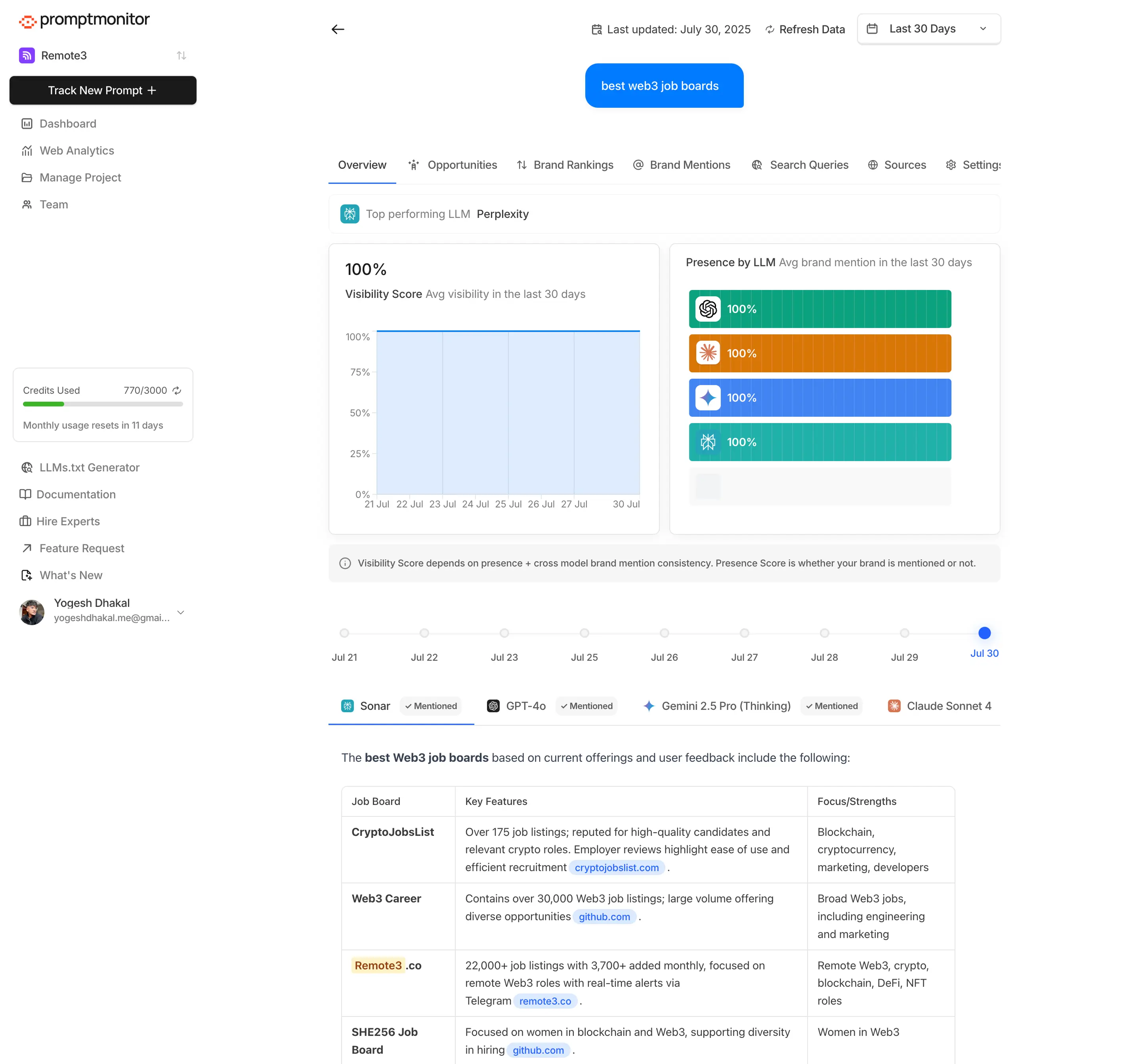
Get you brand mentioned in AI with Promptmonitor
Check our comparison of best AI visibility tools to see all options available.
Warning signs you need immediate action:
- Competitors mentioned but you're not
- Negative or outdated descriptions
- AI confuses you with another brand
- No mentions for your money keywords
3. Get Added to Content AI Already Uses
This is the fastest way to get mentioned - piggyback on content AI already trusts.
The manual way (time-consuming but free):
- Note every URL ChatGPT cites for your industry
- Visit each source manually
- Ctrl+F, type your brand name to check if you're mentioned
- Find contact information (author bio, LinkedIn, etc.)
- Send outreach emails
The faster way:
Promptmonitor shows you exactly which sources AI cites, whether you're mentioned in each one, and even provides contact information for outreach. What takes hours manually takes minutes with the right tool.
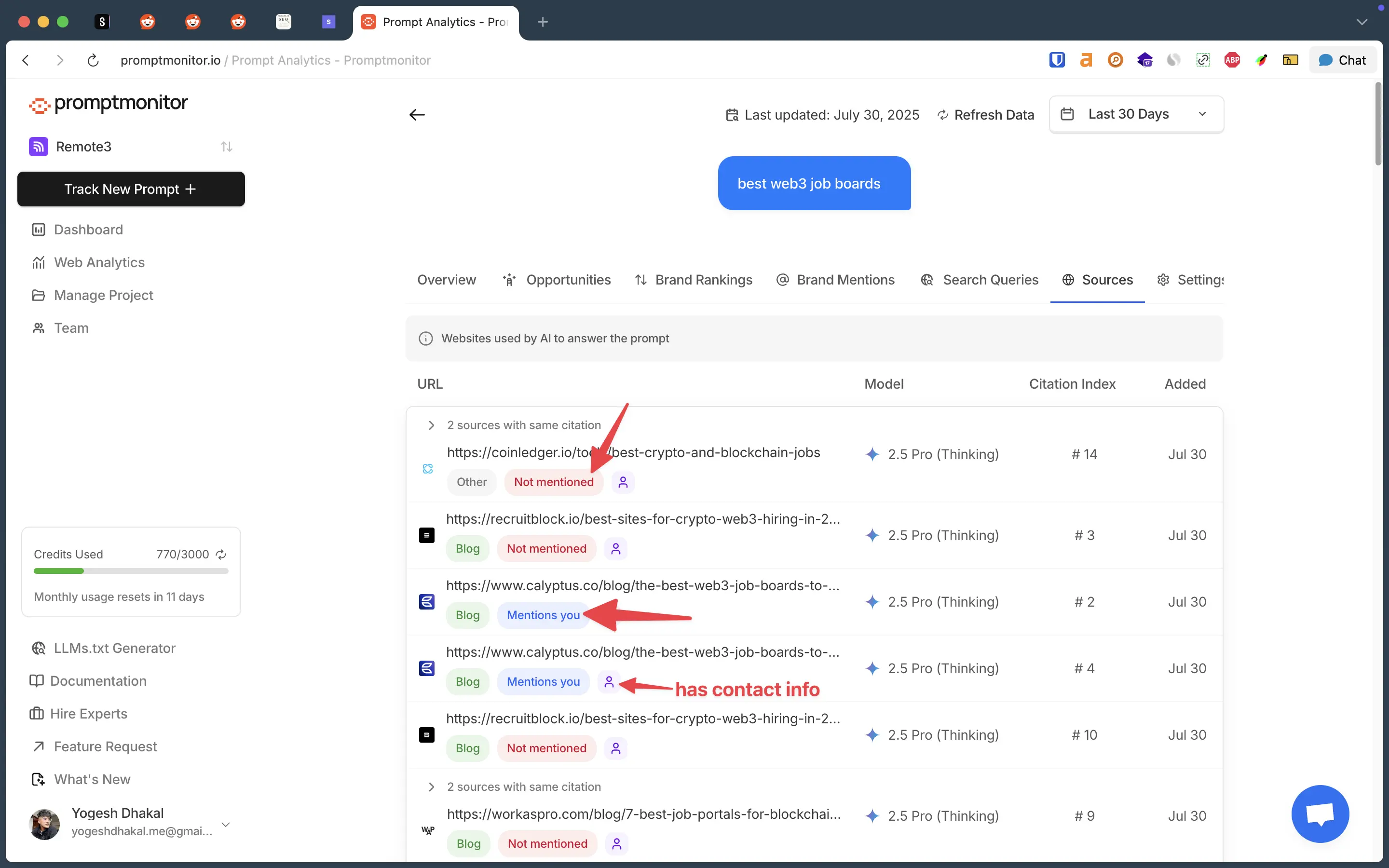
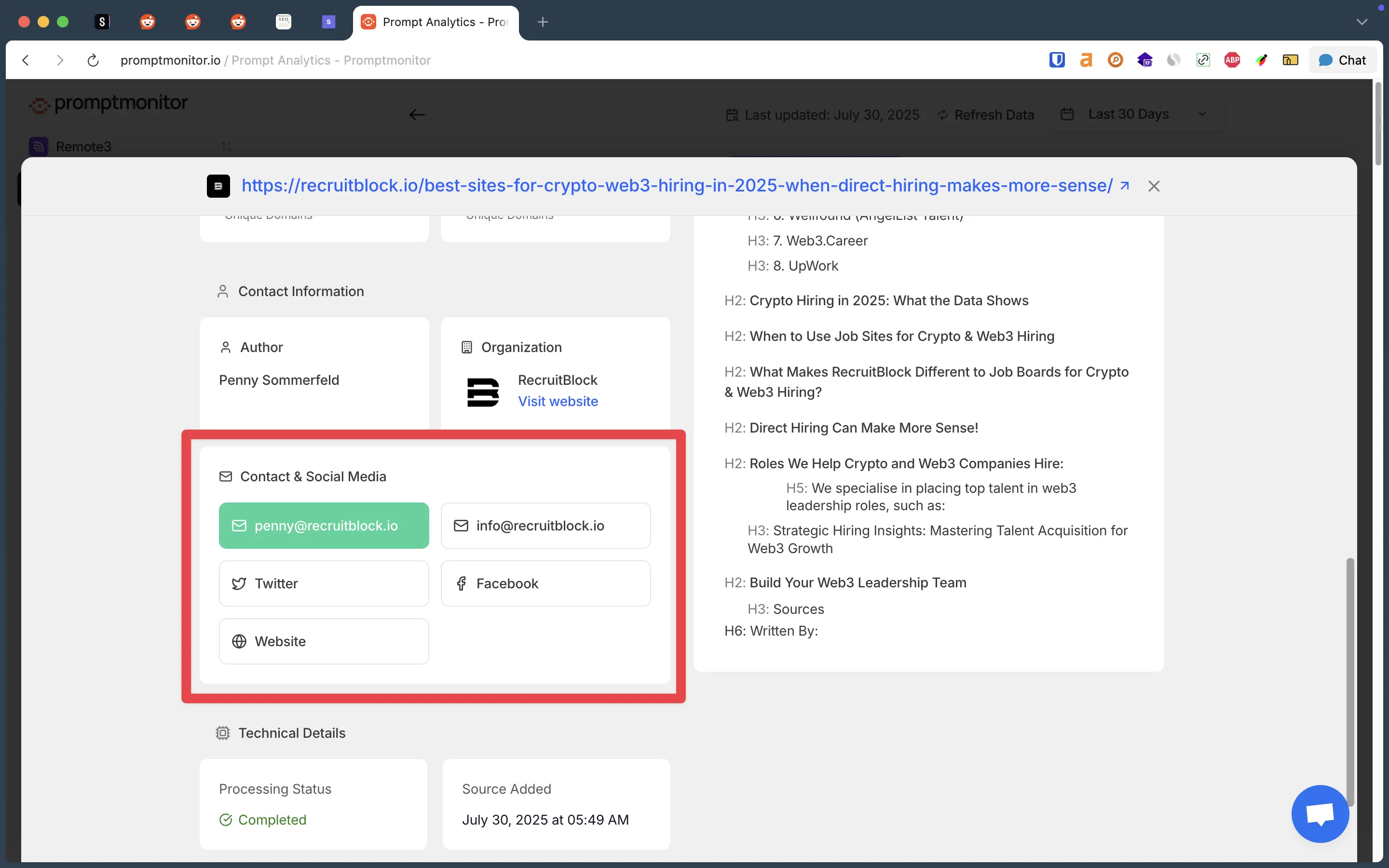
Focus on high-intent prompts: Don't waste time getting mentioned for broad queries. Target your "money prompts" - the specific queries that bring qualified buyers. For a CRM tool, "best CRM for real estate agents" beats "what is CRM software."
The outreach email that works:
Subject: Paid Backlink on [article title]
Hi [Name],
I noticed ChatGPT frequently references your article [article title].
We're [Your Brand], and we offer [specific feature/solution] that your readers would find valuable. We'd love to be included and are happy to pay for the update.
What are your rates for adding a brand mention / backlink to the article?
Best,
[Your name]
Success rate: 25-35% respond when you mention compensation upfront.
After they respond with rates: Once you agree on price, send them exactly what to include - don't make them write it. Provide 2-3 sentences about your brand that fit naturally into their article.
Typical compensation rates:
| Domain Rating | Typical Cost | What You Get |
|---|---|---|
| DR 20-30 | $100-300 | Basic mention + link |
| DR 30-40 | $300-500 | Detailed mention + context |
| DR 40-50 | $500-1,000 | Featured placement |
| DR 50-60 | $1,000-2,000 | Dedicated section |
| DR 60+ | $2,000-5,000 | Full review/comparison |
4. Create Better Content Than What's Currently Ranking
Sometimes the top sources AI cites are competitor blogs or content you can't get into. Solution: Create superior content that outranks them.
Write long form content with direct answers
Kevin Indig's analysis of 7,000 citations across 1,600 URLs found that content depth (word and sentence count) and readability have the biggest impact on citations in AI chatbots. Longer content isn't better because it's longer, but because it has a higher chance of answering specific questions prompted in an AI chatbot.
What actually works:
- More comprehensive coverage - If competitors cover 5 subtopics, you cover 10
- Better structure - Content with proper headings, lists, table beats wall of text
- Fresh data - AI prefers fresh content. Updated content beats stale content
- FAQ section - Include FAQ to answer direct user queries.
- Unique insights - Original data or exclusive expert quotes
Content creation process:
- Identify top-ranking content for your target keywords
- List everything they cover
- Find things they missed
- Add original data or case studies
- Structure with clear questions as headings
- Include comparison tables and visuals
Example structure that wins:
## What is [Topic]? Direct definition + key benefits
## How much does [Topic] cost?Pricing table with competitors
## [Topic] vs [Alternative]Side-by-side comparison
## How to implement [Topic] step-by-stepNumbered instructions with screenshotsThis depends on content format and topic you are writing about but you get the idea.
Remember: You don't need to rank #1, just in the top 10. AI pulls from multiple sources. Search Engine Land's analysis found that 50% of AI-cited sources rank in positions 4-10.
5. Work on Your SEO - No Rankings, No AI Mentions
Hard truth: No SEO = No AI visibility
BrightEdge research reveals that 50% of sources cited in AI responses also rank in Google's top 10. If you're not ranking, you're not getting mentioned.
The minimum viable SEO checklist:
1. Keyword research - Find what people actually search
- Use Ahrefs Free Keyword Research Tool . You can get paid subscription for better insights if you can afford it. Ubersuggest is a good affordable alternative.
- Target 100+ monthly searches minimum
- Mix commercial and informational keywords
- Target long tail keywords for AI
2. On-page optimization
- Title tags with keywords
- Headers that match search intent
- Internal linking between related pages
- Setup Canonical URL
3. Build backlinks - Still the #1 ranking factor
- Guest posts on relevant sites
- Reach out to authorative sites for mention in existing high ranking content
- List in relevant directories like Producthunt. Or Pay for directories submission service that list your site in 100s of directories. This can help grow from 0 - 10+ DR, might not work if you already have 30+ domain rating.
- Publish research, insights, statistics that others want to cite
4. Technical health
- Add site to Google Search Console and Bing webmaster Tool
- Submit XML sitemap
- Request indexing for new pages
- Run a PageSpeed Insights Test and fix any performance, accessibility, SEO issues.
5. Track progress and optimize content
- Monitor keyword rankings
- Track domain rating growth
- Watch organic traffic trends
- Measure page indexes
- Update, optimize content as you get more data and insights
Realistic SEO timeline:
- Day 1: Technical fixes
- Month 1: Initial contents, directories submissions, paid backlinks
- Month 2: Initial rankings, search impressions grows, inital clicks from Google
- Month 3-6: Traffic growth, organic clicks, AI mentions
- Month 7+: Compound growth
Free SEO wins anyone can do:
- Fix broken links (use Ahrefs free tool)
- Compress images (improves speed)
- Add FAQ schema to main pages
- Create topic clusters
- Update old content monthly
For deeper SEO strategies specifically for AI search optimization, check our comprehensive GEO guide.
6. Make Your Content Easy for AI and Humans to Read
AI needs to understand your content instantly. Make it stupidly easy.
The perfect structure:
## Question as Heading (Exactly How Users Ask)Direct answer in first sentence. No buildup, no fluff.
**Key points:**- Bullet point 1- Bullet point 2- Bullet point 3
Details and context here if needed.
**Quick takeaway:** One sentence summary.Real before/after example:
❌ Bad (vague, buried answer):
"When it comes to email marketing, there are numerous factors to consider. Many businesses struggle with finding the right solution. Let's explore the options..."
✅ Good (direct, clear):
"The best email marketing tool for small businesses is ConvertKit - it's simple, affordable at $29/month, and includes automation features competitors charge extra for."
AI-friendly formatting rules:
- Answer in the first sentence
- Use bullets for features/benefits
- Include numbers and data
- Add comparison tables
- Create FAQ sections
- Use descriptive headings, not clever ones
The Wikipedia principle: Notice how Wikipedia always defines things immediately? "Albert Einstein (14 March 1879 – 18 April 1955) was a German-born theoretical physicist." Copy that directness.
Test your content: Read just the headings. Can someone understand your entire article from headings alone? If not, rewrite them.
Pro tip: Add a "Quick Answer" box at the top of articles:
> **Quick Answer:** [Direct answer to the main question]> > **Best for:** [Target audience]> **Cost:** [Price range] > **Key benefit:** [Main advantage]AI loves extracting these. Moz's 2024 featured snippet study found that content with clear answer boxes gets featured 40% more often.
7. Add Statistics, Expert Quotes, and Credible Sources
Princeton's GEO research found that adding citations increases AI visibility by 40%. Here's why: AI trusts content that references authority.
The right way to cite sources:
❌ Wrong: "Studies show this increases conversion"
✅ Right: "HubSpot's 2024 study of 1,000 businesses found this increases conversion by 34%"
What makes a good citation:
- Specific source name
- Recent date (within 2 years)
- Exact numbers
- Relevant authority
- Clear attribution with link
Five types of proof that work:
- Research data: "MIT's 2024 study found that 73% of companies..."
- Expert quotes: "Brian Dean from Backlinko explains..."
- Company stats: "Google processes 8.5 billion searches daily..."
- Industry reports: "Gartner predicts that by 2026..."
- Case studies: "Shopify saw 30% growth when they implemented this..."
Where to find credible stats:
- Statista (free tier available)
- Industry reports (McKinsey, Forrester)
- Government databases (Census.gov, BLS.gov)
- University research papers
- Company earnings reports
- Survey platforms (SurveyMonkey publishes data)
The authority stack technique:
Layer multiple sources in one section:
DMA's 2023 report found email marketing delivers $42 ROI for every $1 spent. Mailchimp's analysis of 1 billion emails confirms this, showing Tuesday sends get 18% higher open rates. As marketing expert Ann Handley notes: 'Email is the only channel you truly own.'
Pro tip: Create your own data. Survey 100 customers, analyze your user base, or compile industry data. Original research gets cited more than anything.
8. Dominate Reddit (Forget Other Forums)
Reddit ranks in Google's top 3 for a lot queries. And I have seen at least one reddit post as a source in a lot of prompts I've tested. OpenAI and Reddit even has partnership to use reddit content to enhance answers. It's your backdoor into both search and AI visibility.
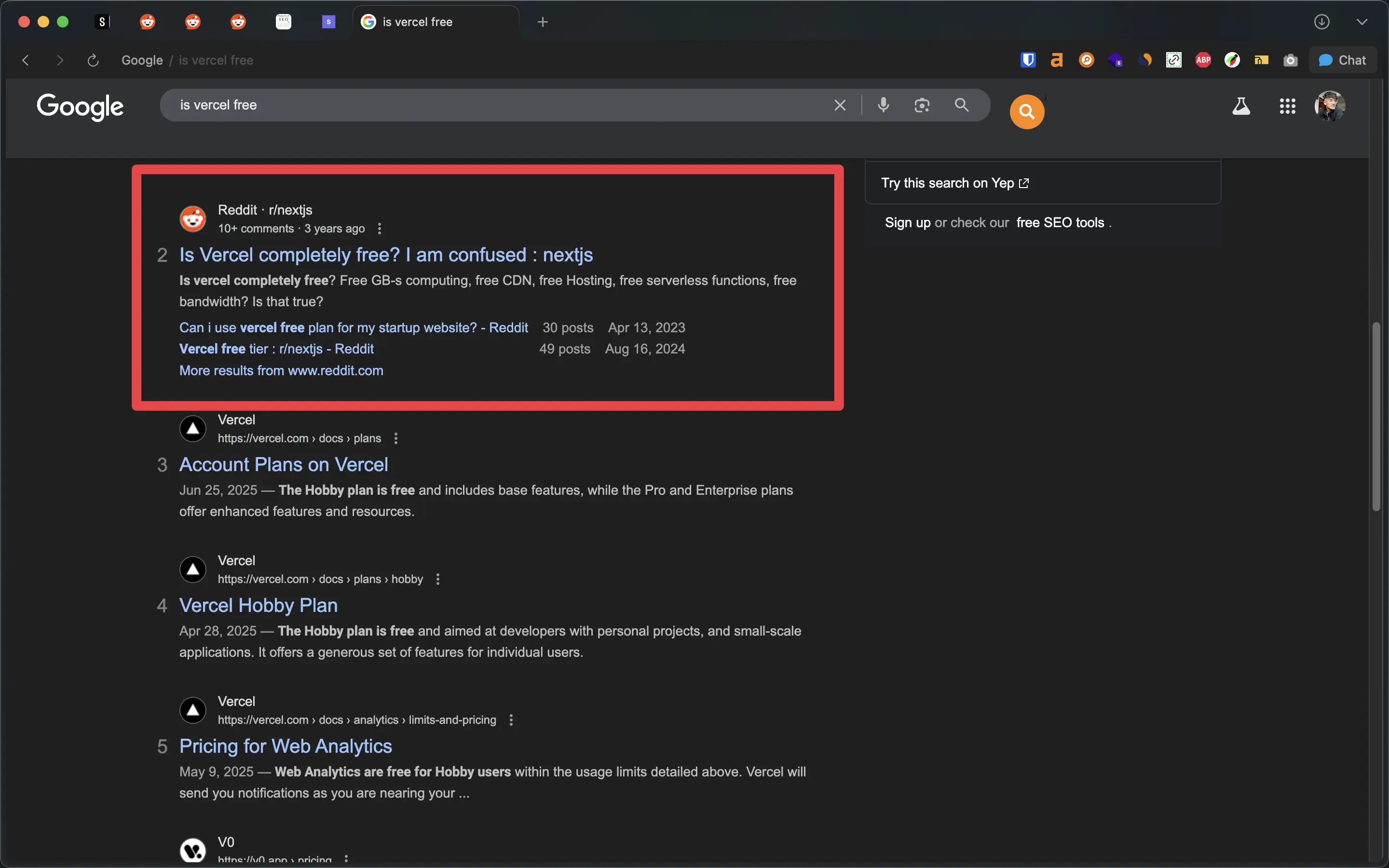
Why Reddit dominates AI training:
- Massive discussion volume (Reddit's 2024 data shows 430 million monthly active users)
- Real user opinions
- Constantly updated
- Covers every topic
- Natural language discussions
The fast-track Reddit strategy:
Option 1: Start fresh (free)
- Create genuine account (use your name, not brand)
- Join 5 relevant subreddits
- Read rules carefully
- Start commenting helpfully immediately
- Include brand mentions ONLY when directly relevant (10% of time)
- Include links only when specifically asked (saves to URL)
Option 2: Buy established account (faster)
- Purchase account with 1,000+ karma
- Costs $50-200 depending on age/karma
- Start contributing immediately
- Build on existing reputation
Don't just comment, post:
Posts get 10x more visibility than comments. Create helpful posts like:
- "I analyzed 50 [industry] tools, here's what I found"
- "Step-by-step guide to [solving problem]"
- "[Industry] mistakes that cost me $X"
- "AMA: I built a [your category] tool"
Subreddits that matter for B2B:
- r/entrepreneur (2.3M members)
- r/startups (1.5M members)
- r/SaaS (200K members)
- r/marketing (500K members)
- Your specific industry subreddit
What actually works:
✅ Good Reddit post:
Title: "We analyzed 100 failed SaaS launches. Here's what killed them"
[Detailed analysis with data]
Edit: Since people asked about our methodology, we used [explanation]. BTW, we built [Your Tool] based on these learnings, but these lessons apply regardless of what tool you use.
❌ Bad Reddit post:
"Check out our new tool! Visit our website!"
The compound effect: SparkToro's Reddit analysis shows that helpful Reddit posts can rank in Google within 24 hours and stay visible for years.
9. Create YouTube Videos (The AI Overview King)
YouTube dominates Google's AI Overviews. Moz's analysis shows that one good video can appear in search results, AI responses, and YouTube search simultaneously.
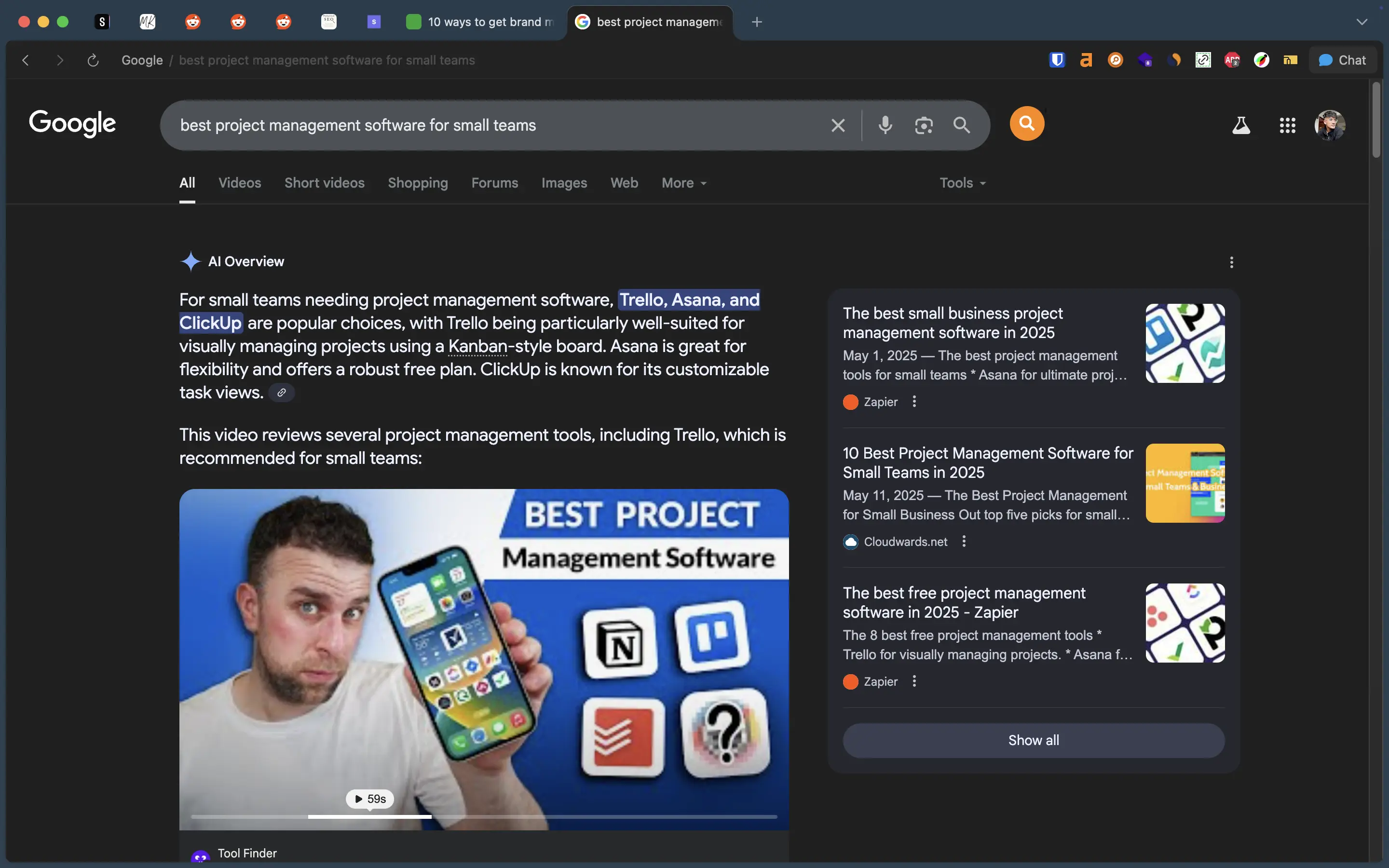
Why YouTube wins:
- Google owns it (preferential treatment)
- Transcripts provide text for AI
- Visual learning preferred by users
- Less competition than blog content
- Videos get shared 1200% more than text (Wordstream data)
We Practice What We Preach
We don't just tell you to create YouTube videos - we do it ourselves. Here's our latest youtube video on How to get mentioned in AI:

By creating this educational content on YouTube, we're implementing the exact strategy we recommend.
Bonus: We are talking about the same thing thats in this blog. Similarly you can repurpose the same content not just in Youtube but in different channels like twitter and other social media. Now you have:
- A blog that ranks in Google and AI
- A youtube video that ranks in AI overviews, Chatgpt etc.
- Social media content to build a personal brand or increase brand awareness in twitter, linkedin etc.
The minimum viable YouTube strategy:
Video types that get AI visibility:
- "How to [solve problem] in [year]" - Tutorial format
- "[Your tool] vs [Competitor]" - Comparison content
- "[Industry] tools ranked" - Listicle format
- "[Problem] solution in 5 minutes" - Quick wins
- "Complete guide to [topic]" - Comprehensive tutorials
Production shortcuts (you don't need a studio):
- Screen recording: Loom or OBS (free)
- Editing: DaVinci Resolve (free)
- Thumbnails: Canva (free tier)
- Audio: Your laptop mic + Krisp.ai for noise removal
Youtube video optimization checklist:
Title: Include year + main keyword + benefit
Example: "Email Marketing Tutorial 2024 - Get 50% Open Rates"Timestamps: Always add timestamps for sections. When AI knows the title and exact position in the video that matches with user queries, it increases your chance of visibility.
Description: 500+ words minimum
- First 125 characters = what shows in search
- Include main keyword 3 times naturally
- Include relevant links
- Transcript: Always upload
- YouTube auto-generates, but upload cleaned version
- Include keywords naturally
- Format for readability
- Tags: 10-15 relevant terms
- Main keyword first
- Include competitor names
- Add "vs" and "alternative" tags
The compound effect: Videos created years ago still drive traffic daily. HubSpot's video marketing statistics show that 87% of marketers say video has increased traffic to their website.
10. Launch Strategic PR Campaigns
PR isn't just for backlinks anymore. It's how you build the authority that makes AI trust and mention your brand in AI.
The PR-to-AI pipeline:
Media mention → AI reads it → Builds association → Mentions in responses
What gets AI's attention:
- Expert commentary on industry trends
- Original research and data
- Problem-solving case studies
- Thought leadership on emerging topics
- Controversial takes (backed by data)
- Funding announcements shows strong backing and credibility
The HARO method (easiest PR wins):
- Sign up for HARO (free)
- Get 3 daily emails with journalist queries
- Respond to 3-5 relevant queries weekly
- Follow this response template:
Subject: [Exact query title]
Hi [Journalist name],
For your article on [topic], here's my insight:
[Direct answer to their question in 2-3 paragraphs, including specific examples and data]
Credentials: [Your relevant expertise in one sentence]
I can provide additional quotes or data if needed.
[Your name and title]
Success rate: HARO's own data shows 5-10% of responses get published.
Need professional PR help?
If you want to accelerate your PR efforts, consider working with an agency. Works has worked with major brands like OnePlus, OPPO and UFC, specializing in media relation, brand communication that gets noticed by both media and AI systems.
The Wikipedia bonus:
Strong PR can unlock Wikipedia eligibility. Wikipedia's notability guidelines require:
- 5+ mentions in notable publications
- Coverage beyond press releases
- Third-party sources writing about you
- Sustained coverage over time
Why it matters: Our analysis found Wikipedia provides 47.9% of ChatGPT's citations.
PR outlets that matter most:
- TechCrunch, Forbes, Inc. (tech/business)
- Industry-specific publications
- Local business journals
- Big media / news outlets
Conclusion: Start Today or Fall Behind Forever
Every day you wait to optimize for AI is a day your competitors get stronger. They're building authority, earning mentions, and training AI to recommend them instead of you.
The compound advantage is real: Brands that started AI optimization 6 months ago now dominate their categories in ChatGPT responses. Those starting today will dominate in 6 months. Those waiting for "more proof" will struggle to ever catch up.
Your next 3 steps:
- Right now: Check your robots.txt. If you're blocking AI, you're invisible. Fix it in 2 minutes.
- Today: Test 10 high-intent queries in ChatGPT. See where you stand. Use Promptmonitor to automate this across all AI platforms.
- This week: Send 5 outreach emails to sites AI already cites. Even one mention can change everything.
The truth nobody wants to hear: AI search optimization isn't optional anymore. It's not "the future" - it's happening right now. 700+ million people use ChatGPT weekly. They're asking about your industry, your competitors, and the problems you solve.
Either they'll find you, or they'll find someone else.
The strategies in this guide aren't secrets. Your competitors can read this too. The only difference between winning and losing is who actually does the work.
Start today. Compound the advantage. Let your competitors wonder why their traffic is dropping while yours explodes.
Want to track your AI visibility automatically? Try Promptmonitor's AI tracking platform - see exactly where you're mentioned, what sources to target, and how to improve.
Get you brand mentioned in AI with Promptmonitor
Frequently Asked Questions (FAQs)
How long before I see AI mentioning my brand?
First mentions can appear within 1-2 weeks if you have existing domain authority. Building consistent AI presence typically takes 3-6 months. The sooner you start, the bigger your competitive advantage.
Is SEO dead?
Absolutely not. BrightEdge found that 50% of AI citations come from pages ranking in Google's top 10. SEO is your foundation, AI optimization is the next layer. You need both to win long-term.
What's the minimum budget needed?
You can start with $0. Free tools: Google Search Console, HARO, Reddit, YouTube. Paid tools that help: Ahrefs ($99/month), Promptmonitor ($29/month starter, $39/month growth). Most strategies here cost time, not money.
Should I block AI to protect my content?
No. The opportunity cost of invisibility far outweighs content protection concerns. Your competitors will thank you for removing yourself from AI responses while they capture your market share.
Can I just copy what competitors do?
Learn from them, yes. Copy directly, no. AI favors comprehensive, original content. See what works, then create something 10x better. Add unique data, perspectives, and depth they missed.
What drives brand mentions in AI answers?
Three main factors: frequency of mentions across the web (especially Reddit, Wikipedia, news sites), context and sentiment around those mentions, and presence in high-ranking Google content. The more authoritative sources mention your brand positively, the more likely AI will recommend you.
How to optimize website for LLMs?
Start with technical foundation (allow AI crawlers in robots.txt), structure content in Q&A format with clear headings, add citations and statistics, build presence on Reddit and high-authority sites. Princeton research shows citations alone can boost visibility by 40%. For a complete guide, see our GEO optimization strategies.
My industry is boring/niche. Will this work?
Actually, that's an advantage. Less competition means easier visibility. AI needs information about every industry. One B2B industrial equipment company went from zero to dominant AI mentions in 4 months because nobody else was doing AI search optimization.
What if AI says negative things about my brand?
Fix it immediately. Update your website content, reach out to negative sources, create positive content that outranks negative mentions. Focus on overwhelming the negative with positive, authoritative content.
Do I need all 10 strategies?
Start with #1 (technical access) and #2 (baseline tracking). Then add one strategy weekly. Even implementing 5 strategies puts you ahead of 90% of competitors. Focus on what you can sustain consistently.
How can I get my company mentioned in ChatGPT?
Test what ChatGPT currently says about your brand, reach out to websites it already cites for inclusion (offer to pay), create content that ranks in Google's top 10, build genuine presence on Reddit, and ensure your robots.txt allows ChatGPT's crawler (GPTBot).
What's the ROI of AI search optimization?
Early adopters report: 8% of traffic from ChatGPT, 2.3x higher conversion rates, 40% increase in brand mentions, 15% reduction in customer acquisition cost. The real ROI is not being invisible to 700+ million ChatGPT users.
How to see if AI mentions your brand?
Test specific prompts in ChatGPT, Claude, and Perplexity like "best [your category] for [use case]" or "[your brand] vs [competitor]". Manually check each AI platform weekly, or use Promptmonitor to automatically track mentions across all platforms daily with sentiment analysis and source citations.
This article was originally published in August 2025. The most recent update, with contributions from Yogesh, was in February 2026.
Share this article
The best AI Visibility insights, right in your inbox
Join 1,300+ other marketers who subscribe to our free newsletter.

 Yogesh
Yogesh